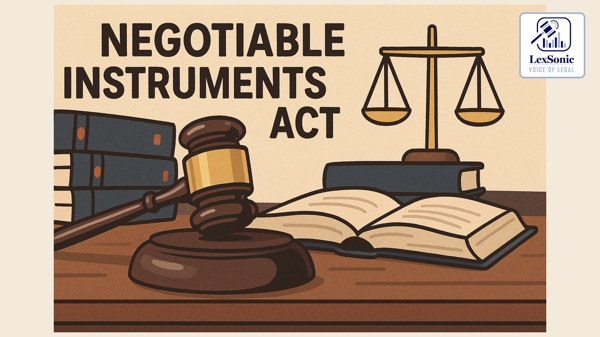A Legally Enforceable Debt: Delhi High Court Dismisses Petition to Quash NI Act Complaint.
01 August 2025
Negotiable Instruments Act >> Criminal Law
A recent Delhi High Court ruling reaffirmed a crucial principle under the Negotiable Instruments Act, 1881 (NI Act): the existence of a "legally enforceable debt" is a matter for trial, not a reason to quash a criminal complaint at its preliminary stage. The Court dismissed a petition seeking to quash a complaint under Section 138 of the NI Act, emphasizing that once a cheque is issued and its dishonor is not disputed, the burden of proving that no such debt exists shifts to the accused.
Factual Background:
The case involved two former principal directors of a company, Gurvinder Singh Toor (the respondent/complainant) and Rohit Malhotra (the petitioner/accused). Toor, holding a 45% stake, decided to sell his shares to Malhotra for Rs. 1.9 crore. A Memorandum of Understanding (MoU) was signed, and Malhotra issued two post-dated cheques to Toor for the full amount.
However, before the cheques' due dates, Malhotra unilaterally terminated the MoU, citing financial difficulties, and issued stop-payment instructions to his bank. Despite this, Toor presented the cheques for encashment, which were dishonored with the reason "Payment Stopped by Drawer." Following the necessary legal notice, Toor filed a complaint under Section 138 of the NI Act.

The Petitioner's Argument: No Legally Enforceable Debt
Malhotra's legal counsel argued that the criminal complaint should be quashed on the grounds that no legally enforceable debt existed at the time the cheques were presented. The core of this argument rested on several points:
Contingent Liability: The cheques were issued in anticipation of a future event—the execution of a formal Share Purchase Agreement (SPA). Since this agreement was never executed, the liability did not "crystallize."
Unilateral Termination: The MoU was terminated by Malhotra before the cheques were presented. The counsel argued that this termination extinguished any obligation, making the cheques invalid.
No Specific Allegations: The counsel contended that the complaint lacked specific allegations that would make out a case under Section 138 of the NI Act.
The Respondent's Argument: A Concluded Contract
Conversely, Toor's counsel maintained that a legally enforceable debt did exist. They countered the petitioner’s arguments by asserting:
Binding MoU: The MoU was a complete and binding agreement regarding the consideration and payment terms. It was a concluded contract, and Malhotra’s unilateral termination was invalid.
Cheques as Payment: The cheques were issued as part of this binding arrangement, not as a mere security for a future event.
Persuasive Civil Court Findings: The counsel brought to the court's attention that in a related civil suit, the Delhi High Court had already ruled that the MoU was a binding and enforceable contract, directing Malhotra to pay the agreed-upon amount. While not legally binding on the criminal court, this finding held significant persuasive value.
Presumption under NI Act: The counsel highlighted the legal presumption under Section 139 of the NI Act, which states that a cheque is presumed to have been issued in discharge of a legally enforceable debt. The burden was on the accused to rebut this presumption during the trial.
Court's Analysis and Findings:
After reviewing the arguments and materials on record, the Court sided with the respondent, affirming that the petition to quash the complaint was without merit.
The Court’s reasoning was grounded in a few key principles:
Judicial Precedent: Citing multiple Supreme Court judgments, including Dashrathbhai Trikambhai Patel v. Hitesh Mahendrabhai Patel, the Court reiterated the essential ingredients for an offense under Section 138 of the NI Act. The absence of a "legally enforceable debt" is a defense that must be proven during the trial, not a basis for quashing the complaint at a preliminary stage.
The Power of Presumption: The Court emphasized that since the petitioner admitted to signing the cheques and filling in the material particulars, the legal presumption under Section 139 of the NI Act was automatically attracted. The burden of proving that the cheques were not issued for a legally enforceable debt rested squarely on the accused.
The Irrelevance of Unilateral Termination: Drawing on the civil court’s finding that the MoU was a binding contract and could not be unilaterally terminated, the Court concluded that the petitioner's obligations under the MoU remained alive when the cheques were presented.
Trial is the Appropriate Forum: The Court stressed that quashing a complaint at a nascent, pre-trial stage would be "un-merited" and would give the accused an unfair advantage. It highlighted that factual disputes, such as whether a legal debt exists, must be adjudicated during a full trial where evidence can be adduced and examined.
Conclusion:
By dismissing the petition, the Delhi High Court underscored that the criminal justice process, particularly in cases involving commercial instruments, should not be "scuttled" before a proper trial has a chance to occur. The ruling reinforces that the defense of a non-existent liability is a matter to be established with evidence, and a mere assertion of it is not enough to stop the legal machinery of the NI Act. It provides a clear message to drawers of cheques: once a cheque is issued, the liability under it is presumed, and a court is unlikely to quash the proceedings based on an argument that a legally enforceable debt was not present.
Section 138, Negotiable Instruments Act - 1881
Negotiable Instruments Act, 1881
